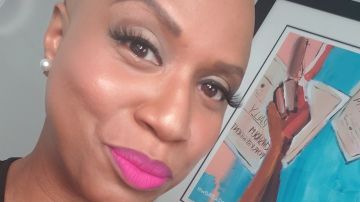Ayanna Pressely Reveals Her Struggles With Alopecia and Hair Loss
Representative Ayanna Pressley, Democrat of Massachusetts, revealed for the first time in a video for The Root that was released on Thursday, that she has been living with a hair loss condition referred to as Alopecia and is currently bald

Photo: Twitter/Ayanna Pressely
Representative Ayanna Pressley, Democrat of Massachusetts, revealed for the first time in a video for The Root that was released on Thursday, that she has been living with a hair loss condition referred to as Alopecia and is currently bald.
In the powerful video, Congresswoman Pressley begins by discussing the relationship she has had with her hair over the years and how going natural and wearing her hair in twists, inspired many black women and girls to embrace their own natural textures.
“I’m Congresswoman Ayanna Pressley and this is a word about why my black hair story is both personal and political,” she begins saying. “Before I was an elected official I did everything. I wore wigs, I wore extensions, and then about four — five years ago — I decided to get Senegalese twists all the way down to my waist and what happened is that I got these Senegalese twists and I feel like I met myself fully for the first time. You know I sort of looked in the mirror and I said, ‘Oh, there I am.’ And it felt good. So what started out as a transitional hairstyle ultimately became a statement and something that I was very intentional about. And I was very aware this hairstyle could be — would be — filtered and interpreted by some as a political statement that was militant, or people said, people will think you’re angry and I said, ‘Well, they already think that. What I was not prepared for was the glorious gift and blessing of the acceptance, and the community, and the affirmation.”
Pressley goes on to mention how wearing her hair in Senegalese twists basically lead to a movement. She started to notice little black girls wearing T-shirts that said, “My Congresswoman wears braids.” She started receiving letters from black women who felt that by seeing the Congresswoman wearing her hair in a natural style, that they could as well. Pressley’s hair became bigger than herself. It made a statement, whether she intended for it to or not.
“My twists had become such a synonymous and conflated part of not only my personal identity and how I show up in the world but my political brand. That’s why I think it’s important that I’m transparent about this new normal and living with alopecia,” she said.
Alopecia is a common autoimmune skin disease that causes hair loss on the scalp, face, and sometimes on other areas of the body. It often leads to baldness and affects as many as 6.8 million people in the U.S. According to the National Alopecia Areata Foundation, alopecia affects people of all ages, sexes, and ethnic groups. But it’s particularly common among Black women. A 2017 study published by the American Hair Loss Association showed that black women are more prone to hair loss, due to Central Centrifugal Cicatricial Alopecia (CCCA), A disorder that causes inflammation and destruction to hair follicles and can even lead to scarring and permanent hair loss. It is believed that certain black hairstyles and styling methods like braids, Senegalese twists, relaxing, and even wearing weaves put Black women at an even larger risk for alopecia. In fact, alopecia caused by hairstyles is often referred to as traction alopecia, due to the tension hairstyles cause to hair follicles. Supermodel Naomi Campbell struggled with traction alopecia after decades of wearing hair extensions. She got candid in a 2017 interview about how the alopecia resulted in extreme hair loss and bald patches but managed to get her hair to grow back after taking better care of it.
Jada Pinkett Smith is another black celebrity who has been transparent about her own experience with alopecia. “I was just like ‘Oh, my God. Am I going bald?’ It was one of those times in my life where I was literally shaking with fear,” she shared during an episode of her Facebook Watch series, Red Table Talk. “That’s why I cut my hair and continued to cut it. She has since received treatment for her alopecia, which seems to be working.
“I get little steroid shots, which are working,” she said. “My hair, in certain bald spots, is growing back. I wrap it a lot and let it rest. I try to leave it alone as much as possible.”
Outside of traction or Central Centrifugal Cicatricial Alopecia, there is no clear research as to what really causes alopecia, though stress is believed to be one common factor.
After waking up to “sinkfuls of hair,” Congresswoman Pressley finally realized that she was going bald. The hair loss accelerated relatively quickly and regardless of what she did — wrapping her hair at night, sleeping with a bonnet, sleeping with a silk pillowcase — she was still met every morning with more hair loss. She recalls how she had to wear a wig the day she had to cast a vote to impeach President Donald Trump. She compares her hair loss to feeling like she was mourning the loss of a limb and how difficult it was for her to show up that day.
“I exited the floor as soon as I could and I hid in a bathroom stall. I felt naked, exposed, vulnerable. I felt embarrassed. I felt ashamed. I felt betrayed. And then I also felt that I was participating in a cultural betrayal because of all the little girls who would write me letters, come up to me, take selfies with me hashtag twist nation,” she said. “And I thought of those T-shirts and just kept revisiting them and I immediately knew I was going to want to — when I felt ready — go public. Because I felt like I owed all those little girls an explanation.”
She explains that regardless of what others may think, she believes her hair is in many ways political.
“The reality is that I’m Black and I’m a Black woman and I’m a Black woman in politics and everything I do is political,” she said.
At the end of the video Congresswoman Pressley is seen taking off her wig and revealing her smooth bald head, explaining that she’s not here just to occupy space but here to create it. This reveal wasn’t just a brave and vulnerable thing to do but it was in many ways an important and political message that speaks deeply to black women, their hair, and the reality of what navigating the beauty world — in a world that still very much pushes Eurocentric beauty standards on us — looks like. I deeply respect Pressley for openly sharing her struggle with the world, especially because she could have easily hid this from everyone if she chose to and that would have been her business and her right. Instead, she decided to share her story not just to free herself from her secret and the shame it was causing her, but to inspire other women — black women especially — to love themselves, regardless of what their hair looks like, even if that means not having any.
Representative Alexandria Ocasio-Cortez tweeted how inspired she felt by Pressley’s reveal.
Could you imagine losing all your hair on the eve of an enormously public day? And then turning that intensely intimate ordeal to make space for others?
Ayanna, you are a living blessing.
Everyone, please take a moment out of your day to watch @AyannaPressley’s #BlackHairStory. https://t.co/0G9NCaPmuG
— Alexandria Ocasio-Cortez (@AOC) January 16, 2020
“Could you imagine losing all your hair on the eve of an enormously public day? And then turning that intensely intimate ordeal to make space for others? Ayanna, you are living a blessing,” She wrote.
Pressley making peace with her alopecia is no easy task. While there are types of alopecia that result in hair growing back, regrowth is often unpredictable, with some folks having a total loss of hair on their scalps. And while there are treatments, there is no known cure.
I think it’s important that we not only acknowledge Pressley’s reveal and struggle but also honor her for sharing it with the world — not just for herself — but for others. She took a very intimate issue and turned it into something that could be healing and inspiring for others — Black women especially.
“I am making peace with having alopecia. I have not arrived there. I am very early in my alopecia journey. But I’m making progress every day,” she says towards the end of the video. “And that’s why I’m doing this today. It’s about self-agency. It’s about power. It’s about acceptance.”

















